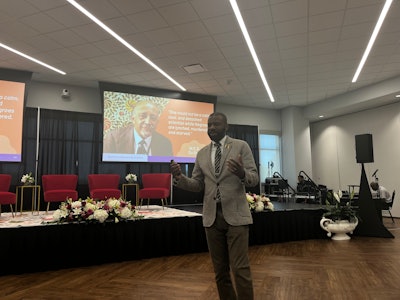 Dr. Ivory A. Toldson delivered keynote at the Higher Education Leadership Foundation's Ideation, Innovation, and Collaboration summit.
Dr. Ivory A. Toldson delivered keynote at the Higher Education Leadership Foundation's Ideation, Innovation, and Collaboration summit.
Speaking at the Ideation, Innovation and Collaboration summit sponsored by the Higher Education Leadership Foundation (H.E.L.F) at Claflin University, Toldson, a professor of counseling psychology at Howard University, urged HBCUs to break free from imitating Predominantly White Institutions (PWIs) and instead create their own innovative research paradigms that authentically serve Black communities.
"HBCUs have to be leaders. HBCUs have to advance and innovate, and most importantly, HBCUs can't look at predominantly white institutions as models of what we should be.”
Toldson's impressive journey as an "HBCU researcher" began in high school when he conducted research at Southern University. He recounted a pivotal encounter with his high school English teacher who, on his graduation day, gripped his shoulders and said, "Ivory, I'm so proud of you. You're going to be something great if you just get rid of your anger."
This comment came after Toldson had challenged her rejection of his chosen research topic: "Why the Miseducation of the Negro is still relevant to our experiences today." Similar tensions arose when he later chose to research how the FBI suppressed Black Power movements in the 1960s and 1970s.
These early experiences foreshadowed some of the challenges he would face in academia. After completing his dissertation on Black men in the criminal justice system and submitting a portion to a top-tier journal, Toldson received a rejection that described his research as "needlessly contentious and emotionally loaded."
This feedback prompted deep reflection on how academia views objectivity in research, particularly when researchers share backgrounds with their subjects. In his keynote address, Toldson referenced Dr. W.E.B. Du Bois, who once said, "One could not be a calm, cool, and detached scientist while Negroes are being murdered and starved."
"White privilege enables white researchers to claim authority on Black issues while questioning the ability of Black people to conduct objective research," Toldson noted, referencing a tweet of his that garnered nearly 20,000 reactions, resonating with researchers who had been criticized for caring about the communities they study.
Toldson illustrated his research philosophy using the Japanese art form of Kintsugi, where broken pottery is repaired with gold, making the repaired version more valuable than the original. He explained that his goal in research is "not to talk about populations from this damaged deficit perspective and then talk about how to close an achievement gap... but to create a vision of how things could be better than before, not just back to the status quo."
He challenged HBCUs to create research enterprises that innovate rather than imitate, sharing an anecdote about Pablo Picasso's transformation after being introduced to African art.
"When we think about our own research," Toldson remarked, "we have to think about who's criticizing it and whether or not someone should be saying that our research is needlessly contentious and emotionally loaded. Maybe if they aren't saying that about your research, then you're not doing research."
After his journal rejection, Toldson pivoted to what he calls his first "mixtape" – a novel that he wrote titled Black Sheep: When the American Dream Becomes a Black Man's Nightmare. The book explored the connection between Black men in academia and Black men "in the streets," published through his stepfather's publishing company, House of Songhai.
Toldson drew parallels between his experience and that of rapper T.I., who, after being dropped by his record label, created mixtapes distributed directly to his target communities. As these mixtapes gained popularity, exceeding his initial studio album, the label returned with a new offer, to which T.I. responded, "My price has gone up."
"So, when we think about our own research, and when I think about my research, I believe that's what happened to me – get rejected, first mixtape, and now they want me," Toldson reflected. He has since enjoyed the privileges often associated with prestigious PWIs, but attributes this to creating research that felt "right and natural" to him and delivering it directly to the communities it would benefit.
Throughout his talk, Toldson presented a vision where HBCUs leverage their institutional power to publish research that might not be accepted by top-tier publications.
"If you have research that won't be accepted by a top-tier publication, you do the graphic work, you get the copy editing, you get peer reviews from other scholars at HBCUs, you put it together and it's a Claflin University publication," he told the attendees who gathered at the private South Carolina HBCU for four days to strategize about the future of these storied institutions. These publications, he added, could then be shared across HBCUs, with press teams promoting findings that directly impact communities.
Highlighting the progress of HBCUs in research classification, Toldson noted that Howard University recently became the first R1 HBCU, and the number of R2 institutions has grown from two to between 12 and 15 in less than a decade. This growth, he explained, comes from HBCUs advocating for evaluation criteria that don't penalize them unfairly.
"HBCUs didn't get there by incrementally becoming more like Predominantly White Institutions," Toldson emphasized. "So now that we're here knocking on the door, how do we blast through?"
Soul food, he added, “didn't come from emulating white cooks. Jazz, rock and roll, and hip hop didn't come from emulating white musicians. And good research on Black people won't come from emulating white scholars.”
Participants in attendance said that Toldson's call for authentic research paradigms offered a powerful framework for institutions seeking not just to advance, but to transform higher education through the unique lens and legacy of HBCUs.



















